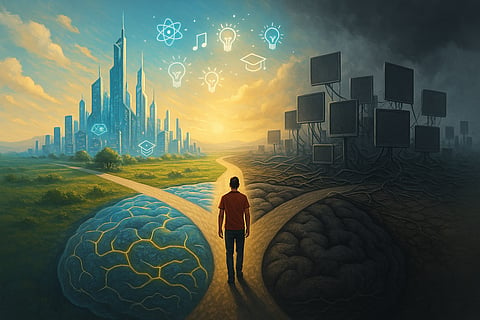
- HOME
- TRENDING
- PEOPLE
- COMMUNITY
- LIFESTYLE
- OUR PUBLICATIONSOUR PUBLICATIONS
- MASALA RECOMMENDS
- MASALAWEDS

We are living in this new age world where everything we need is just a prompt away. With just a few taps and voice commands, AI speeds up our tasks. Things that used to take hours or even days can be done within minutes. It's becoming part of our routines, from how we work, shop, date, relax, and also connecting with others. But convenience comes with a price so it's worth pausing to ask, are we actually gaining more brain power or slowly giving it away?
Artificial Intelligence has transformed numerous industries, and is coming up with incredible breakthroughs in science, physics and medicine, saving more lives. Its becoming a game changer in many businesses, enabling us to work smarter, better and faster.
We have always been finding ways to make our lives easier for centuries, ever since the agricultural revolution to the industrial age. So automation is not something new. If we are given a chance to let our minds rest, we would often take it, no matter what.
Studies have revealed that our brains are pros at processing information. However, when it comes to storing data, trying to remember more and more information leads to our brain suffering from information overload. This leads to less productivity and creativity because instead of using our brain to process information, it's being used to retain it instead.
So this becomes an argument supporting that automating frees up our mental space so that we can focus more on higher-order thinking.
Does AI free up mental space? Yes. But the real question is: what are we actually doing with that freed-up space? Because here’s the thing, those same tools that are helping us get sharper can also slowly chip away at our ability to think for ourselves, especially if we start leaning on them too hard.
90% of Gen Z employees use at least 2 AI tools weekly to reduce workload which is fine if it can help with simple and repetitive tasks where AI doesn't make mistakes and can save you time. People are using AI to make life easier, but the problem comes when they get to the point where users completely rely on it for everything, reaching a point where they simply can't be bothered thinking for themselves anymore. This leads to a lower level of critical thinking and learning ability.
There was a study where participants were separated into 3 groups and asked to write an essay. The first group used only ChatGPT and this was called the LLM group. Group two was called the search engine group, where they were permitted to use any website, but AI was strictly forbidden.
The third group used just their brain, and this was the brain-only group. Participants' brain electrical activity levels were measured between each group using EEG analysis. The results revealed that the LLM group had lower brain activity and performed worse on memory and writing. They found out that even after they stopped using AI, their brain didn't bounce back fully.
The drop in engagement and memory recall meant that when participants leaned on AI too heavily, they weren't truly processing or retaining information. So this weakens their ability to think independently and apply knowledge in new situations.
Outside of work, AI is quietly taking over personal choices as well. Its presence in daily routines feels convenient, but we don't realise the deeper hidden impact. Decision making is like a muscle and if we constantly rely on AI to tell us what to eat, what to wear, what to watch, if you should cut your hair, get a tattoo, travel solo, block him/her or asking for a response to a particular message someone sent you or asking AI to craft a message to someone they like or a friend, we slowy stop asking ourselves: What do I really want? What will happen is that over time, our instincts start to dull, weakening our confidence to trust in our own judgement.
There is a difference between using AI as a companion rather than relying completely on it. For example, someone might ask AI, “What should I reply to this girl I have a crush on?” and follow the answer without thinking. What they are doing is, they are outsourcing their emotions and personality to a machine. Others might use ChatGPT for suggestions, like asking for healthy dinner recipes and then choosing the most viable option that fits their mood and values. The difference is that one path erodes independence and then the other enhances it.
Whereas application of AI as a companion would be ideal in enhancing production and mental development, reality has it that people are tilting in favour of application of AI as a convenience tool and not a development tool. Instead of applying it to come up with new ideas or accelerate thinking, people are applying it as a quick fix or a shortcut. That is, applying it as a way to get done and dusted, quick answers without having to put in too much effort.
Your thunder shouldn't be plagiarised by an AI but multiplied. I mean a certain employee can ask ChatGPT to write a complete report. It will be work that's not only unoriginal but shallow. Another uses GPT to create ideas and drafts, build outlines, but adds their own voice. They are using same tools but are generating two very different outcomes.
So however sophisticated AI might become, humans should trust in their ability to think for themselves. What philosopher René Descartes once summed up quite neatly was this: “I think, therefore I am.” If thinking is what human beings are all about, then giving it up too easily could slowly undermine what makes us who we are.